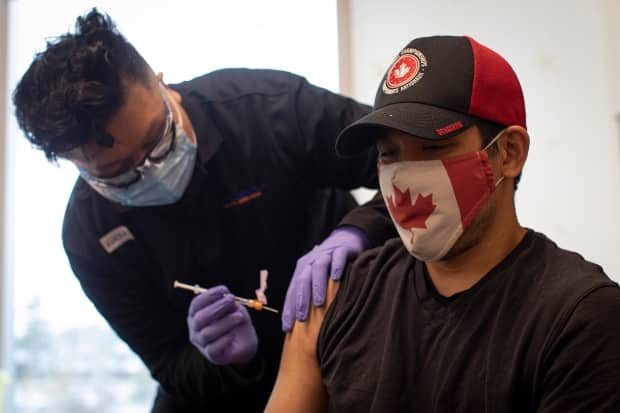New COVID-19 cases have dropped 80 per cent — and 5.3 million more shots are set to arrive next week

After months of mostly bad news, Canada's chief public health officer said today the country's COVID-19 trajectory has improved dramatically and an anticipated flood of doses should put the country "on the path back to the things we miss."
As of Friday, Canada was averaging about 1,500 new cases a day — an 80 per cent decline from two months ago and a number comparable to the caseload reported in mid-October, before the deadly winter surge, according to data provided by the Public Health Agency of Canada (PHAC).
Since peaking in mid-April, new cases, hospitalizations and deaths nationwide have drastically declined.
Over 27.7 million vaccine doses have been administered across Canada and 2.6 million doses were given in the past week alone, Dr. Theresa Tam said.
About 72 per cent of all Canadians over the age of 12 have been partially vaccinated and 11.8 per cent have had both doses.

"As Canada steps into the vaccination fast lane, there is a lot for us to take pride in," Tam said.
"We're in a good position," said Dr. Howard Njoo, Tam's deputy. "I believe the case curve is now moving downwards and, if we keep up with vaccinations and public health measures, I believe the curve will continue to descend."
According to data collated by the University of Oxford-based Our World in Data, Canada now ranks first globally in terms of the share of the population with at least one dose of the vaccine, having surpassed previous leader Israel yesterday.
About 63.6 per cent of all Canadians — a metric that counts all people in the country, including those younger than 12 who are not yet eligible for a shot — now have some sort of vaccine coverage. That's marginally better than the 63.2 per cent reported in Israel.
But Canada lags other countries when it comes to getting the second "booster" shots into arms. "Of course, we want the two doses faster," Tam said.
Moderna steps up
Those numbers are expected to tick even higher now that Moderna has confirmed it will ship more than seven million vaccine doses to Canada this month.
More Moderna shots are set to arrive next week than the company delivered in the first three months of this year. Brig.-Gen. Krista Brodie, the military commander leading vaccine logistics at PHAC, said 2.9 million of the seven million shots will arrive next week, with the remainder expected over the week of June 21.
Combined with Pfizer's promise to ship 2.4 million shots, that means more than 5.3 million mRNA doses will be delivered to provinces and territories next week alone — a figure that should supercharge the country's immunization campaign.
With so many eligible Canadians already vaccinated with at least one dose, the focus will shift now to administering booster shots to build immunity as the highly infectious Delta variant — the strain that was first identified in India — begins to circulate in many communities.
'Shoot for the stars'
Tam said Canada should "shoot for the stars" and aim to vaccinate much more than 75 per cent of the population with at least one dose.
In the past, Tam has said Canada must vaccinate at least three-quarters of the population to effectively curb the spread of the virus and protect hospitals from being overwhelmed. Now, she said, she wants the country to go even higher to ensure a fourth wave can't take hold.
"If we get variants that are more transmissible, and if we get variants that evade the vaccine immunity by a little bit, it's much better to shoot for higher," Tam said.
Tam said getting just one shot isn't enough to let Canadians go back to doing all the pre-pandemic things they miss because the booster shot is needed to build substantial immunity against COVID-19.
"Because of the Delta variant, I'm advising caution, particularly between the first and second doses," she said.
"It's so important for everyone to realize that one dose doesn't do it. You really need to be fully vaccinated," Njoo added. "Hopefully, we can accelerate and have many more Canadians receive their two doses by late summer and maybe even earlier, who knows."
Njoo said he's hoping Canada doesn't hit a "plateau" with vaccination rates stuck at their current levels — a trend that some countries, notably the U.S., have experienced.
He said public health officials are working on strategies to get the vaccine-hesitant onside.
AZ doses on the way
Joelle Paquette, the director general responsible for vaccine procurement at Public Services and Procurement Canada, also provided some promising news to AstraZeneca recipients Friday.
Paquette said the company has confirmed one million doses of that product will arrive during the week of June 28. While those doses have been promised for some time, the government has been unable to offer a firm delivery timeline before now.
While the National Advisory Committee on Immunization (NACI) has said Canadians can mix-and-match vaccines, this AstraZeneca shipment will help inoculate some of the 2 million Canadians who already have received a shot of that product.
Meanwhile, the 310,000 Johnson & Johnson doses that Canada has in its possession face an uncertain future. Doses of this one-shot product have been sitting in storage for weeks while Health Canada verifies the product's safety.
Workers at Emergent BioSolutions, a Maryland-based company that was manufacturing that product, inadvertently ruined 15 million doses of the J&J vaccine by mixing up materials intended for the production of AstraZeneca shots.
U.S. regulators today told J&J that about 60 million doses made at that troubled factory cannot be used because of possible contamination. Canada's supply of doses, which were made at the Emergent plant, will be kept out of the supply chain for now, Paquette said.

